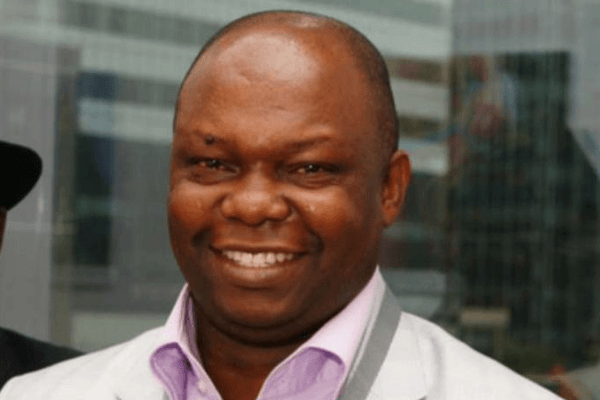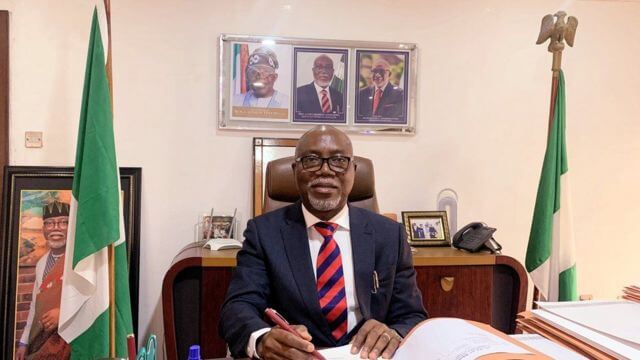We are about to witness a mud-fight between two gods of integrity. In a Nigeria where the mantra is, if you see something, say something, Minister of Finance and Coordinating Minister of the Economy, Wale Edun, elected to say something. And he did say something last Wednesday. “We talked about inflation, where has it come from? It’s come from eight years of just printing money. And the issue is that that money was not matched by productivity…For eight years, the weak were left to their own devices. It is the privileged few that took everything” he said while appearing before the Senate Committee on Finance.
Edun’s appearance in the senate was a total shellacking of the administration of Mai Gaskiya, Muhammadu Buhari. Falling short of naming that government one in same frame with Ali Baba And the Forty Thieves, Edun accused Buhari of every conceivable economic malfeasance, finally heaping the blame of Nigeria’s current economic regression at his doorsteps. He went ahead to promise that the Tinubu government would audit the N22.7 trillion ways and means advance which the Buhari regime incurred.
Bashir Ahmad, former media aide to Buhari, was however of the opinion that blame-shoveling was bad politics. Comparatively, he said, the PDP was better at dressing its stench in pleasant deodorant. Posting on X, Ahmad wrote: “I often wonder why, as a government, we concentrate more on amplifying the faults of the previous administration rather than acknowledging its numerous achievements. The PDP seems to have a more skilful approach to politics than we do in the APC…it’s rare to find instances where President Yar’adua’s (PDP) government criticized President Obasanjo’s (PDP) or where President Jonathan’s (PDP) government faulted President Yar’adua’s (PDP).”
What they cooked that burnt down the house of Nigeria is gradually exposing itself. Get your popcorn and be ready for the rumble in the jungle. When someone tries to hide behind their finger, my people compare them to the exact scenario that both Bola Tinubu and Buhari find themselves today. Their story is perfectly told in the Epa and Aja tale. The tick, which the Yoruba call Epa, is a parasitic member of the Arachnida family of insects. Arachnids are a class of joint-legged arthropods which include, among others, spiders, scorpions, ticks, mites, etc. As parasites, they feed on mammals, birds, and sometimes reptiles and amphibians. They feed on the blood of their hosts by attaching to them firmly with their proboscis. In consuming their blood, ticks satisfy their nutritional requirements. When a tick parasitizes its hosts, it acts as vector through which serious diseases that affect humans and animals are transmitted into the host. Eventually, while the tick is satisfying its survival quest, the host will suffer either diseases or anemia and eventually die. So, when Epa assumes that it is killing the host; take for instance, Aja, the dog, unbeknown to it, it is killing itself. The day the dog dies, the tick dies too. Yoruba express this as Epa npa’ra e, o l’ohun npa’ja.
Though he may right now be sunk in the pastime of feeding his cows in Daura, the truth is, Muhammadu Buhari’s self-imposed title of Mai Gaskiya may be on its way out of the retired General’s lapel. There is an ongoing attempt to deconstruct him as either the most naïvely inept Nigerian president to have lived or the imbecilic landlord who opened his house to burglars and watched while they looted his treasure. Buhari’s own political party, the APC-led government, is spearheading this deconstruction. So, should his successor, living through the mantra of “see something, say something” which has seized the information highway today, keep sealed lips and not disclose alleged massive theft of Nigerian patrimony that it is privy to? Should Tinubu see the wound on the sole of his foot as one that has familial imprimatur and thus walk loose with it? Should he say something about the massive theft that went on during the Buhari government which he has information about or say nothing? Minister of Finance and Coordinating Minister of the Economy, Wale Edu, chose the latter.
Either as blame-shoveling or “saying something when something is seen”, Buhari looks like he is in a very bad shape, image-wise. He has unfortunately landed in the hand of a successor government that is ready to scapegoat anything in sight to justify its inertia. Already, it is clear to everyone that if there is one thing in surplusage from this government today, it is blame-shoveling and immense capacity to reverse itself. In the last nine months, we have seen the government blame everybody, everything but itself for its inability to do the magic it advertised so ebulliently during the campaigns. COVID-19, Godwin Emefiele, PDP, Buhari and all what ought-nots have suffered this victimhood of government’s antics. Edun and this government have also blamed Emefiele’s alleged reckless spending of the overdraft that the Buhari government collected from the CBN as largely accounting for the food and security crises that Nigeria is battling. Right now, Nigeria is seeking Interpol’s help to arrest three suspects alleged to have stolen the sum of $6.2m from the CBN, using Buhari’s forged signature. They are believed to have done this in cahoots with Emefiele who is on trial on 20-count charges. My haunch is that, if Emefiele has his days in court, the courtroom will explode like Hiroshima did and the matter may drift off like a fog, similar to the Sambo Dasuki security fund scandal. In the same vein, this government has reversed itself so effortlessly on policies it advertised with glee, like Jay Jay Okocha did on the field of play. The last reverse was the annual levy it imposed on expatriates which it revoked pre-beginning last week.
For an administration like the Tinubu government that is tottering in pitch darkness and fumbling for a way out, the eternal wisdom in the tale of the tick and dog seems self-explanatory and self-evident. The “Epa npa’ra e…” presents in a number of nuggets. First is that, it can come in the form of the question that has been asked repeatedly: How can the Tinubu government, and virtually all its runners, divorce themselves from the 8-year colossal wastage and failure of the Buhari government? The president, like a nursing mother, hunchbacked Buhari into power and gave him the wings with which he flew. Until a railway line halved them into their two separate ways, Tinubu defended every of the Buhari policies with the vigour of a matador. From insecurity, Fulani herders’ rapacious bloodletting, (where are the cows?) to dwindling economy and every allied matter of state policy, Tinubu was there for Buhari. Bayo Onanuga, Special Adviser to the president, has almost had the mucus dripping out of one of his nostrils flip inside the second as he struggles to claim that Tinubu never requested Buhari to enter the forest of the brave – the Igbo igbale. So, for the Tinubu government, through Edun last week, to surgically try to separate itself from the Buhari government will be akin to an Epa which is trying to kill the Aja. Edun, with froth metaphorically foaming out of his mouth, attempted to do that last week.
Unfortunately for the government, head or tail, it loses. This is even if it listens to the self-centered counsel of Ahmad and elects to make the calamity wrought by the Buhari government a family affair. Its situation would be comparable to that of a man all alone inside a bunker who decides to allow a stench-like fart escape from his buttock. He, all alone, will bear the stench. How reconcilable would it be for Tinubu to say that the Buhari he deodorized as recently as December last year, as emanating “from the rarest phylum of virtuous servant-leaders,” whose emergence could be likened to that of “leaders…(that) happens only by divine orchestration,” a man of “absolute and undiluted integrity” had now been discovered to have sat on a government that is surrounded by a mass of maggots?
We were still battling the waywardness found in the Buhari government’s Ways and Means when, as usual, Nigeria relapsed into its perennial orgy of massive kidnap of school pupils. The latest happened last Thursday at the Government Secondary School and LEA Primary School, Kuriga, Kaduna State. About 280 pupils and teachers were said to have been abducted by bandits. This has triggered national outrage. The bandits were reported to have invaded the Kuriga area of the Chikun Local Government Area of Kaduna State by shooting at their victims in a Gestapo manner. As usual of Nigerian Aso Rock Villa, government is flexing its effeminate muscles and throwing threats into the sky. Sub-nationals and individuals too have tethered their usual empathy offering at the grove of this rapacious god of banditry.
The incessant incidences of kidnapping in Nigeria have grown into a hydra. They have become a source of national threat. Nigeria, according to researchers, boasts of a phenomenally large public and private schools which are nearly 97,000, the largest in Africa. Its primary education sector, according to Aly Verjee and Chris Kwaja, is roughly equivalent in size to the 98,000 public elementary and secondary schools in the United States. Today, these schools are under severe threat from terrorists.
The above-named scholars collated the history of Nigeria’s bloodletting. According to them, in their research work entitled An Epidemic of Kidnapping: Interpreting School Abductions and Insecurity in Nigeria (African Studies Quarterly Volume 20, Issue 3, October 2021) beginning from 2014, “the small, non-descript town of Chibok in Borno State in northeast Nigeria” earned the notoriety worldwide with the abduction of 276 girls. Since then, Nigerian northern schools have known no peace. Though the abduction sparked global outrage, Nigerian governments have moved on nevertheless. The Chibok abduction which was the cusp upon which the APC government wove its political campaign to seize power from Jonathan in the 2015 election was hung on, contributed immensely to the defeat of Jonathan. He was accused of mishandling the kidnapping. However, some top persons in this government were alleged to have organized it to embarrass Jonathan. Buhari thereafter campaigned on a pedestal of promise to restore security to Nigerians.
The scholars’ collation of the spate of kidnappings is frightening. According to them, before Chibok, other kidnaps were carried out though they attracted less media campaign. This was because the AC, CPC alignment and realignment was afoot and the masters of media orchestration in the AC had not aligned with the Buhari CPC. In 2013, 41 students and one teacher were shot/burned alive at the Mamudo Government Secondary School in Yobe State. Same year, another 44 students and teachers were murdered in a separate incident at the College of Agriculture, Gujba, about 120km east of Mamudo, reported Verjee and Kwaja. Similarly, in February 2014, another educational institution in Yobe State, which happened to be the fourth, was attacked. After the attack, 59 students were killed at the Buni Yadi Federal Government College, 30km south of Gujba. This was followed by the Chibok abductions in April 2014. With Buhari, the man who flaunted his epaulettes as a military general in civilian attire now in office, 110 girls got abducted from the Government Girls Science Technical College in Dapchi, Yobe State in February 2018.
December of that year, said Verjee and Kwaja, saw another mass abduction in Buhari’s home state of Katsina. More than 300 boys were forcefully taken out of the Kankara Government Science Secondary School. Equally, on December 19 of that same year, 18 students of an Islamic school in Dandume, close to Kankara, were detained by a kidnapping group, while in February, 2021, 42 people, which included 27 students, were kidnapped from the Government Science College in Kagara, Niger State. On February 26, figures bandied, of between 279 and 317 students, were kidnapped from the Government Girls Secondary School in Jangebe, Zamfara State. In March 2021, there were two further mass abductions and three attempted abductions, all in Kaduna State. On March 11, 39 students were abducted from the Federal College of Forestry Mechanization in Mando. A tip-off to the Nigerian Army averted the kidnap on March 13 of pupils of the Turkish International Secondary School, Rigachikun. On April 20 of same year, 20 students and three staff of Greenfield University in Chikun, Kaduna State were abducted. Five of them got killed by their captors. Plateau State was to get its own share on April 29 when four students were abducted from the King’s School, in Gana Ropp, Barkin Ladi. Then, on May 30, 136 children and several teachers were taken from the Salihu Tanko Islamic School in Tegina, Niger State. In June, 103 students were abducted from the Federal Government Girls College in Birnin Yauri, Kebbi State and on July 5, 121 children were abducted from the Bethel Baptist High School in Maramara, Kaduna State. So many more that space would not allow us reel into happened as figures provided by Verjee and Kwaja.
It will appear that, under Tinubu, Nigeria has entered its season of kidnap epidemic again. In the paper under discourse, Verjee and Kwaja made some recommendations that I found to be very profound. The first is that successive Nigerian governments have conflated the social challenge of kidnap for security challenges and as such, have solely treated school abductions as security problems which needed to be solved solely by military response. Government does this by fortifying the schools. In doing this, Nigeria is merely treating symptom rather than a national disease. Why it is impossible to get a let out of this is that, first, due to the large scale of Nigeria’s education system, deployment of soldiers and police in the protection of schools can never work.
Rather, according to Verjee and Kwaja, government must first address the trust deficit that exists between state security actors and the people. A very meager percentage of Nigerians perceive state security actors as credible. They have always had a checkered history of corruption and violence. There is a profound belief out there that Nigeria’s top security chiefs do not want insecurity to end due to the money they make from it. This perception fuels further fear of militarization and repression, leading to predatory behavior of state security actors.
Whatever it will take, Nigeria must get to solve the pandemic of school kidnappings. The audaciousness of its perpetrators and the seeming combine of many forces in carrying out the kidnappings make it very complex to get rid of. We must as well realize that this epidemic is just a tiny fraction of Nigeria’s political economy of violence. We have always had an ineffective and underperforming state, as well as sparse economic opportunities which have been fueling the school kidnappings. Already, the Kaduna government has rented private negotiators to secure the release of the kids. At the end of the day, multiple of millions of Naira would be paid to these no-gooders and like the boulder of Sisyphus, in no long a time, the terrorists will strike again. And Nigeria will begin another round of sorrow, tears and blood.




